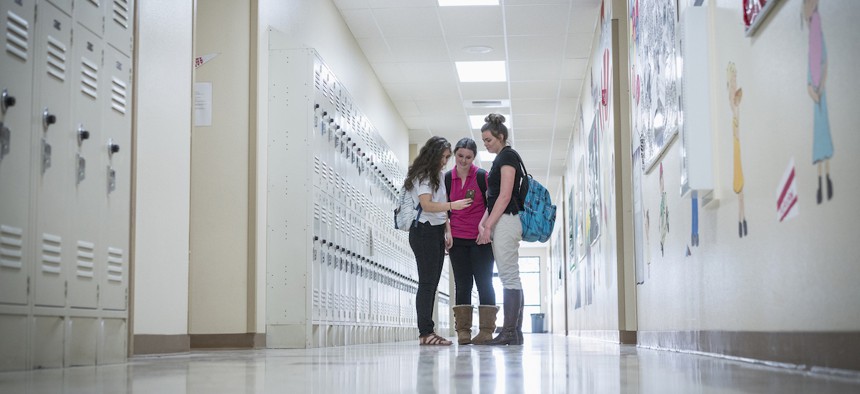Iowa governor signs statewide ban on cellphones in class

Hill Street Studios via Getty Images
The law requires school boards adopt a policy that, at minimum, bans the use of cellphones in class beginning in the 2025-2026 school year.
This story was originally published by the Iowa Capital Dispatch.
Starting in the 2025-2026 school year, public Iowa K-12 school districts will be required to set policies that, at minimum, ban the use of cellphones during class time under a law signed by Gov. Kim Reynolds Wednesday.
The ban on cellphones during instructional periods was one of the governor’s top priorities heading into the 2025 legislative session. At a ceremony signing the measure into law, Reynolds said House File 782 will help improve Iowa students’ learning and mental health.
“Smartphones and other digital devices have made information, media and entertainment immediately available at any time, any place, and this level of connectivity has changed the way that we live, learn and communicate,” Reynolds said. “And while the positive impacts are undeniable, we can’t ignore that our phones can also be a source of constant distraction in our daily lives, whether at home or at work or, especially for our kids, at school.”
Reynolds cited a Pew Research Center survey that found 72% of high school teachers say students being distracted by cellphones is a major problem in their classroom. Data also shows policies limiting cellphones and other personal electronic devices have a positive impact on student outcomes, Reynolds said, pointing to statistics on higher grades and lower disciplinary rates at Iowa schools that have already put cellphone policies in place.
The Ottumwa Community School District, which implemented a cellphone ban for the entire school day starting in the current school year, saw a 12% increase in A and B grades and a 60% decrease in failing grades for 8-12 students compared to the first semester of the previous year. Additionally, the district saw a 20% decrease in referrals for behavior issues.
Mike McGrory, superintendent of the Ottumwa Community School District, said “Ottumwa schools this year experienced firsthand how powerful a bell-to-bell cellphone policy can be,” and said the new law will help other schools across the district see improved learning and engagement with students.
“The results, as the governor was alluding to, far exceeded our expectations,” McGrory said. “They were truly profound … by eliminating those learning distractions for our students, it allowed the following three things: (for) our students to refocus on their learning, focus on their mental health, and also — this is so important — with building meaningful face-to-face relationships with each other.”
The Ottumwa school district’s policy of no cellphone use for the entire school day is a higher standard than what would be required under the new law. School boards are required to set a ban on cellphone use during class times by July 1, but have discretion on whether to restrict devices during other periods of the school day. The Iowa Department of Education is required to develop and distribute a model policy for use as boards develop their own policies.
The law requires that cellphone bans include exceptions, such as for students who are English Second Language (ESL) learners or who have an Individualized Education Program (IEP) or 504 plan that involves accommodations using a cellphone or other personal electronic device. Parents will also be allowed to petition a school district for their child to retain access of their cellphone during class periods, if they establish a “legitimate” reason related to a student’s mental or physical health that requires the device to be readily available.
Gabe Polich, a senior at Des Moines Hoover High School, also spoke on the measure, saying that he has seen improved grades as a result of not using his cellphone in class. Hoover High School implemented a ban on cellphones during class at the beginning of the 2024-2025 school year, which Reynolds said resulted in a 14% increase in A and B grades, a 12% decrease in students’ failure rate and decrease of out-of-school suspensions by 60%.
Polich said he is less distracted in class and that students are happier in school because of the ban.
“I wasn’t happy they were taking away our cellphones,” Polich said. “But now I can see that it’s really improved our school.”
Reynolds joked “my grandchildren weren’t very happy with me either” when she brought up the school cellphone ban, but that the measure will help other students like Polich learn and be more engaged in schools with the policy in place.
The governor said she believes the policy will help Iowa schools and students while including important provisions addressing concerns about students’ lack of access to phones. This includes the provisions allowing exceptions, as well as requiring schools update their safety and emergency plans, with guidance from the state departments of Education and Public Safety, to account for communications needs during these situations.
Reynolds also thanked lawmakers for their efforts getting the bill to her desk, saying she was happy to see it pass through the Legislature with bipartisan support.
“I think it’s a great example of how we can come together to support simple, common sense solutions that can make an overwhelmingly positive difference,” Reynolds said.
Iowa Capital Dispatch is part of States Newsroom, a nonprofit news network supported by grants and a coalition of donors as a 501c(3) public charity. Iowa Capital Dispatch maintains editorial independence. Contact Editor Kathie Obradovich for questions: info@iowacapitaldispatch.com.





